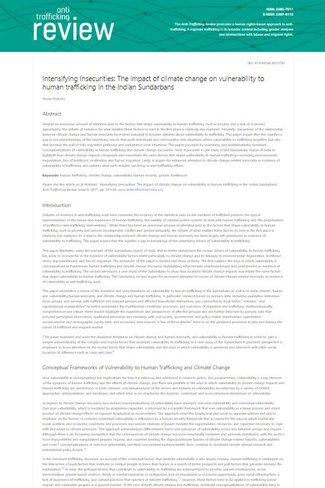Intensifying Insecurities: The Impact of Climate Change on Vulnerability to Human Trafficking in the Indian Sundarbans
2017
- Author
- Molinari N (Anti-Trafficking Review)
- World region
- South Asia
- Origin of migration
- Indian Sundarbans
- Area of transit
- No data available
- Destination of migration
- No data available
- Who is affected
- Children, Men, Women
- Type of climatic event
-
Rapid-onset event, Slow-onset event
Cyclones, floods, storms, sea level rise, land erosion.
- Type of migration/mobility
-
No data available
People can be displaced by climate change and/or compelled to migrate for work away from their families to make ends meet as a result of climate change impacts.
- Destination industry or sector
-
No data available
- Type of modern slavery
-
Forced commercial sexual exploitation, Forced labour, Forced marriage, Human trafficking
- Link between climate change, migration and modern slavery
- Direct, Indirect
- Key vulnerability factors
-
Ongoing climate change events hinder communities' ability to recover and adapt. Given the dependence of local communities on access to natural resources to survive, climate change exacerbates food and livelihood insecurity and leads to growing debt. Discrimination, marginalisation and poverty increase vulnerability to the effects of climate change and human trafficking. High numbers of people historically affected by these issues live in this region (i.e. Muslim, Scheduled Caste, and Scheduled Tribal groups, undocumented Bangladeshi migrants and landless households). Poor, rural, low-caste and marginalised women and their children are disproportionately affected by climate change and are in turn more vulnerable to human trafficking. The precarious position and high level of need of people who migrate makes them more vulnerable to modern slavey.
- Summary
-
This report uses the case of the Indian Sundarbans to explore the links between climate change and vulnerability to human trafficking. It aims to provide further evidence on the issue to inform integrated strategies on climate change adaptation, environmental protection and anti-trafficking.
- Recommendations
-
This report identifies a need for research on context-specific ways that vulnerability to human trafficking is amplified by climate change and socio-ecological pressures, including displacement. It stresses the importance of understanding political and economic factors. It argues that anti-trafficking efforts must address climate change and environmental protection as a way to reduce vulnerability and build local capacity.



